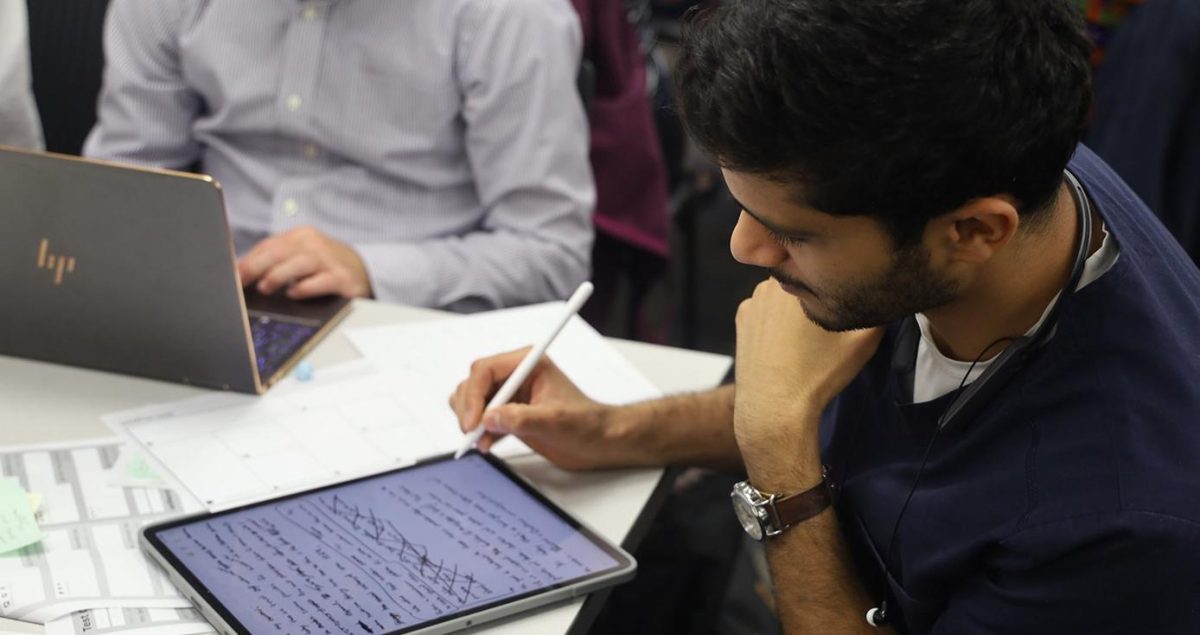There are several misconceptions about startups among students, according to Lauren Grice.
“Generally, we see how [startups] are portrayed in media,” Grice, vice president of engineering at Respair, Inc. and accelerator program coordinator for LifeX, said. “Like Facebook, right? But that’s not the reality of what working at a startup is like, nor does it really address the entire supporting ecosystem that goes into the success of startups.”
The Big Idea Center, LifeX and Venture for America held a panel discussion on the various career trajectories and supporting roles in startups — new businesses started by entrepreneurs — with moderator Lauren Grice. Panelists included Pierre Habib, Micah Headley and Angelica Herrera. The panel discussed the difference between startups and larger corporations and how students could get involved.
Grice said she did not enjoy her previous job at a big health care corporation. She said she often found herself bored and opted to work at a startup for more independence and leadership.
“I’ve really found a lot of value working for a startup because I have a lot of ownership and autonomy over my work,” Grice said. “I get to say, ‘Hey, here’s where I think you should go with this,’ or ‘I want to tackle this.’ And then in addition to that, it’s feeling like you’re making a direct impact because you’re not really doing much in a startup that doesn’t absolutely need to be done.”
Startups often have a few employees who are tasked with a wide range of responsibilities. Habib, senior customer experience manager at HoneyComb Credit, said it could be surprising to students that there are no strict roles given to employees as seen in larger corporations.
“Every day was different,” Habib said. “Your title is nothing. You can do everything. So, it’s like experiences related to sales. You’re going to do a lot of phone calls that you don’t really know much about, and you could just try a lot of things.”
Herrera, vice president of development at Reach Neuro, Inc. said it is important for students to network with multiple professors to enter the startup field. She said students should show their authentic selves when forming professional relationships.
“I think a big thing very early on is, you know, I don’t want to cause too much conflict,” Herrera said. “I don’t want to rock the boat that is already barely hanging on. But, you know, we just kind of have to push through that and say, ‘No, this is not going to work because of x, y and z reasons,’ and just not be afraid to do that.”
Habib said students should be creative and adamant about finding opportunities in startups. He said students have the incorrect notion that the desirable positions in a startup are unattainable to them.
“Send a random message to one of their employees on LinkedIn,” Habib said. “Just be like, ‘Hey, I’m interested in what you do. I’m a student. I’m not looking for a job anytime soon right now, but I’m just interested in what you do.’ See if you can go shadow. If you can’t get to the person that you want, ask them if they can ask that person for you.”
Startups are funded by venture capital or angel investors. Headley, program coordinator at AlphaLab, said students may have a preconceived notion of investors that is incorrect. He added that some investors mislead students into thinking that their ideas could become successful.
“Investors aren’t mean like they are on Shark Tank,” Headley said. “They’re actually worse. They’re nice, but they’re not kind a lot of times. I don’t know how many people have come to me for office hours and they’re like, ‘investors told me this was a great idea,’ and it was the worst fit.”
Habib said students who are interested in creating startups should make sure they are doing so for the right reasons. He said it is important to start with the correct goal to minimize risk.
“If your goal for starting a startup is to get acquired for a company, it’s probably not a good idea,” Habib said. “I think your goal should be to take this company and make it profitable.”



